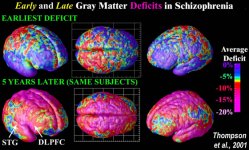Greg Robbins
Member
Hello,
I have taken antipsychotics for a number of years and noticed that my memory and attention span aren't what they used to be, so I did research which confirmed my belief that antipsychotics do indeed cause cognitive impairment. This occurs by the reduction of brain volume starting in the parietal cortex and spreading to the frontal lobe.
Of course this is only my belief and I would never stop taking my medication without the consent and supervision of the prescribing MD.
I have taken antipsychotics for a number of years and noticed that my memory and attention span aren't what they used to be, so I did research which confirmed my belief that antipsychotics do indeed cause cognitive impairment. This occurs by the reduction of brain volume starting in the parietal cortex and spreading to the frontal lobe.
Of course this is only my belief and I would never stop taking my medication without the consent and supervision of the prescribing MD.

